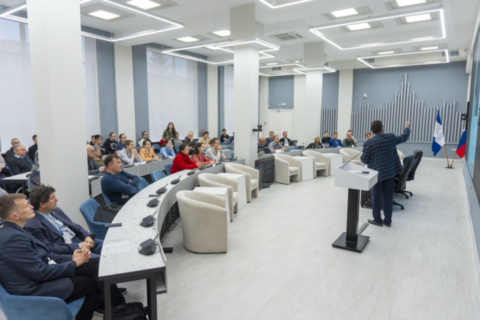On October 23rd, the 12th David Klyshko Memorial Seminar on Quantum Technologies opened at the Convention Hall of the Council of South Ural State University.
The event was opened by the SUSU Rector Alexander Wagner, Deputy Governor of the Chelyabinsk Region Aleksandr Kozlov, and Minister of Education and Science of the Chelyabinsk Region Vitaliy Litke.
Being organized by SUSU jointly with the Quantum Technology Centre of the Lomonosov Moscow State University (MSU), this event gathered about fifty in-person reports and fifteen poster presentations from all across our country: from Moscow, Saint Petersburg, Kazan, Novosibirsk, and other Russian cities.
In the early 2020s, Chelyabinsk became one of the centres of scientific attraction in the field of quantum computing and quantum optics thanks to the fact that SUSU opened a Quantum Engineering of Light Laboratory headed by Doctor of Sciences (Physics and Mathematics) Sergey Kulik.
"Quantum technologies are traditionally based on three pillars: quantum computing, quantum communication and quantum sensorics," said Head of the SUSU Quantum Engineering of Light Laboratory Sergey Kulik. "It is for the first time that SUSU has been chosen as a venue for holding of this seminar. We are working as part of a megagrant, and a big laboratory is functioning here. In addition, David Klyshko Seminar is the voice of the School of Quantum Optics, and among David Klyshko's disciples was Boris Zeldovich, who worked at SUSU (Chelyabinsk Polytechnic Institute back then) in the 1980-90s. His followers still work here, and this is a good grounds for the flourishing of quantum technologies in Chelyabinsk."
Quantum communication is a matter of the future, but scientists discuss the technologies and algorithms required for that already today. Among the first reports delivered at the seminar was one by Aleksey Kalachev from the Federal Kazan Scientific Center. It covered quantum repeaters and long-time memory – that is, the devices allowing to store quantum information and distribute it during long-distance transmission. The next report was presented by Sergey Molotkov from the Institute of Solid State Physics RAS (ISSP RAS) in Chernogolovka, who talked about the protocols of the relativistic quantum cryptography (co-authored by Sergey Kulik).
Also, the creation of the national quantum network in Russia is being discussed at the conference.
"Jointly with our colleagues from the Kurchatov Institute and the Russian Railways company, who ware implementing the road map on quantum computing, we decided to assemble an Interuniversity Quantum Network. In fact, we have already installed and are testing the equipment, so there is a chance to put the network into operation before the end of the year and later universities (from Moscow to Primorsky Krai) will join the network, including SUSU from Chelyabinsk," explained Director of the MSU Technology Transfer Centre Aleksey Odinokov. "We suppose that the network will be a multi-level one: in some parts units will be connected to optic fibre directly, and in other parts via a quantum main line, currently being built by the Russian Railways. Rosatom company is actively working on engineering of quantum computers, and we hope that when quantum telecommunications cover our whole country, Rosatom will produce their quantum computers. This will make our country scientifically competitive."
The project of a quantum network is unique for Russia, but at the same time quantum communication lines are being built in China as well: from Beijing to Shanghai.
The Klyshko Seminar will continue its work till October 25th.




